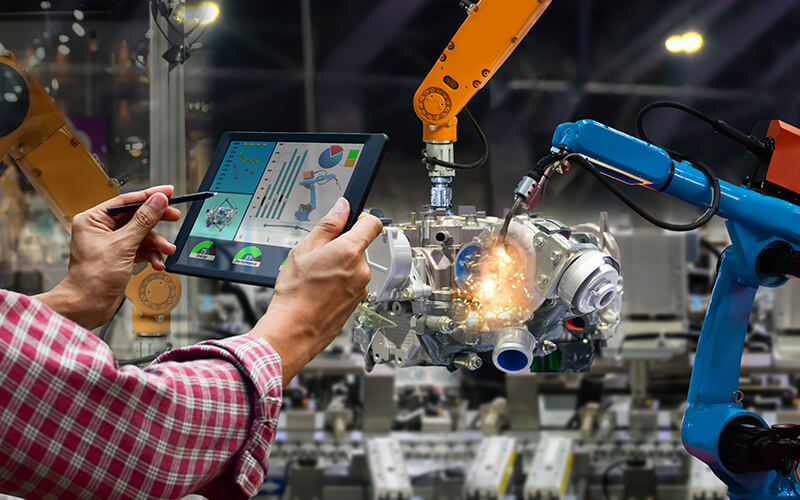manufacturing
New trends in the manufacturing industry
With the emergence of Industry 4.0, the manufacturing sector is witnessing a radical shift, especially in digitisation. Everything we use, from cars to electronic devices, is manufactured in a factory. This makes manufacturing a key building block of our society. Data shows the global manufacturing industry’s growth to be at a rate of 18.2%. After the COVID-19 pandemic disruption, 68% of decision makers in the manufacturing sector are focusing on better resilience and agility as top business priorities.
Latest trends in the manufacturing industry
This year has been highly conducive to industrial growth. The active and disruptive growth we’re witnessing is the cumulative effect of recovery from the pandemic and technological growth. From cutting-edge technologies to process optimisation, digital transformation in the manufacturing industry include the following:
Technology transformation
-
Digital twins:
The manufacturing industry uses digital twins to simulate a physical object or process before it goes into production. This technology can also simulate a supply chain under controlled conditions. For example, a popular commercial aircraft engine manufacturer gathers specific and detailed data from over 13,000 products using telemetry and IoT. This data helps them create digital twins with the Microsoft Azure platform to monitor and optimise performance and maintenance. -
Process automation:
Modern factories are using AI to complete tasks that were done manually previously. This elevates productivity and accuracy and lowers the cost of production. Other key enablers of automation are robots and cobots that enhance the work of humans. This is highly prevalent in the automotive sector. AI also helps with the predictive maintenance of equipment and vehicles. Automation also manages dangerous tasks for humans, ensuring that safety norms are met in the manufacturing sector. -
Data collection and analysis:
IoT technology gathers meaningful data from the production process. This helps businesses analyse data and predict problems before they occur. Data analysis also helps make the production process sustainable with reusable and recyclable products.
Process outsourcing
-
Optimisation of the labour force:
Problems such as skill gaps, labour shortages, and difficulty finding the right talent in your location are major hurdles for any manufacturing business. By outsourcing core processes such as HR, finance and accounting, sourcing and procurement, customer service, and sales and fulfilment, you get access to top-of-the-line talent from across the globe.
Building a resilient labour force
Because of skill shortage, the U.S. may see 2.1 million vacant jobs in the manufacturing sector by 2030. Added to this are the unprecedented disruptions such as the pandemic that require businesses to build a resilient workforce. By diversifying the workforce, suppliers, and partners to whom you outsource, you can build an environment that withstands any disruptions due to internal or external events. Businesses are also investing in employee skill development and continuous learning, which results in high retention rates.
The sustainability push
Consumers need to know if the products they buy are manufactured sustainably. They want information on your carbon neutrality efforts, fair wage policies, and inclusion of talented, marginalised communities in the mainstream economy. Manufacturing industries contribute 24% of the greenhouse gas emissions in the U.S. This is one of the largest shares, along with transportation and power generation. Process optimisation and automation greatly uplift the sustainability efforts of a business.
Riding the wave of these trends
Moving beyond standard processes towards automation can be overwhelming for many businesses. If they do not implement them in a structured manner, it may not deliver maximum results and may even fail. Businesses need the guidance of domain experts to embrace the potential of new technologies and innovative processes. You cannot transform from legacy to hyperconnected and automated manufacturing processes overnight. Connecting siloed processes and operations with low-code system implementation is a step-by-step approach that requires planning with short, medium, and long-term goals.
For organisations on the digital transformation journey, agility is key in responding to a rapidly changing technology and business landscape. Now more than ever, it is crucial to deliver and exceed organisational expectations with a robust digital mindset backed by innovation. Enabling businesses to sense, learn, respond, and evolve like living organisms will be imperative for business excellence. A comprehensive yet modular suite of services is doing precisely that - equipping organisations with intuitive decision-making automatically at scale, actionable insights based on real-time solutions, anytime/anywhere experience, and in-depth data visibility across functions leading to hyper-productivity, Live Enterprise is building connected organisations that are innovating collaboratively for the future.
How can Infosys BPM help?
Our digital services transform your manufacturing process beyond standardised operating models and benchmarks. Read more about the business process in manufacturing industry.





